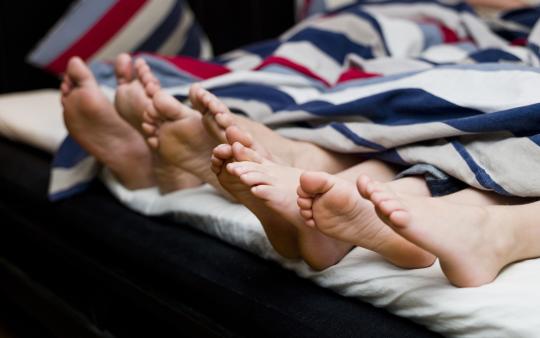If your family has made the proactive decision to bed share, or have been thrown into it out of necessity, there are guidelines that should be followed to ensure the safety of your little one. Being equipped with the knowledge to do it safely can make the bed sharing experience a positive one.
The recommendation from the Canadian Paediatric Society for healthy sleep is to have your baby sleep in a bassinet or crib beside your bed or in the same room as you for the first 6 months. They recommend that babies sleep in their own bed, on their back and with nothing in bed with them. But there are times in a new parent’s life when great sleep seems like a thing of the past. For some families, bed sharing is done out of belief and desire. For other families, it is done out of pure survival. In those circumstances, it may be the only way anyone can get sleep!
Co-Sleeping vs. Bed Sharing
There is actually a difference between the two. Co-sleeping is when you sleep in the same room in close proximity to your baby but they are in a bed of their own. Bed sharing is when you share the bed with your baby. If this is how you choose to help your family get their much-needed rest, follow these tips to make it safer.
General safe sleep practices for baby
- Regardless of where baby is sleeping, whether it’s in your bed, their own bed, or a bassinet, she should be placed on her back to sleep.
- Choose a firm mattress.
- Make the crib free from blankets, stuffed animals, bumper pads, etc. The only thing that needs to go into the crib is a tight fitted sheet and your baby!
- Make sure that the mattress fits well in the crib or bassinet and that there are no spaces between the it and the walls of the bed.
- Your baby should not sleep on a couch, futon, or any other soft surface where they have the potential of rolling into a crack and suffocating or rolling off.
How to safely bed share:
- Make sure that the surface you are sleeping on is flat and firm with no added blankets. Parents should wear a warm enough sweater to bed that they can keep the blankets away.
- If possible, put your mattress on the floor flush with the wall. Be very mindful of the crack between the bed and the wall.
- Do not bed share if you have been drinking alcohol or have taken any prescription or recreational drugs. These factors can make you sleep too soundly to be directly beside your baby.
- Do not swaddle your baby while bed sharing as this can cause them to overheat. Keep in mind that your body heat will warm baby up so make sure that the room is not too hot as well.
- Do not allow older siblings to sleep beside the baby while bed sharing.
- Avoid bed sharing if you smoked during your pregnancy or are currently a smoker. There is a higher risk of SIDS associated with it.
- Parents who are exceptionally exhausted or deep sleepers should consider co-sleeping rather than bed sharing.
Note: There are also apparatuses that allow you to sleep beside your baby while they are in a special bed in your bed.
Transitioning from bed sharing
Some families sleep very well together, whereas others do not get the sleep that they need with their children in their bed. When the time is right for your family, you can make small changes to ease their adjustment and transition from bed sharing to sleeping independently.
- Start by having your child in a bassinet, crib or for older children, a mattress beside your bed rather than in your bed.
- When possible, it is a good idea to start the transition from bed sharing to independent sleep during the day. As your child adjusts, work your way up to more frequent naps in the bed, then try bedtime and overnight.
- Keep trying!
Chances are your child has become accustomed to, and comfortable with, sleeping with you and having you by their side. Naturally, when you start the transition, your little one may not love the idea right away. Keep trying - the more you do it the more comfortable they will become with it.
Safe sleeping!






